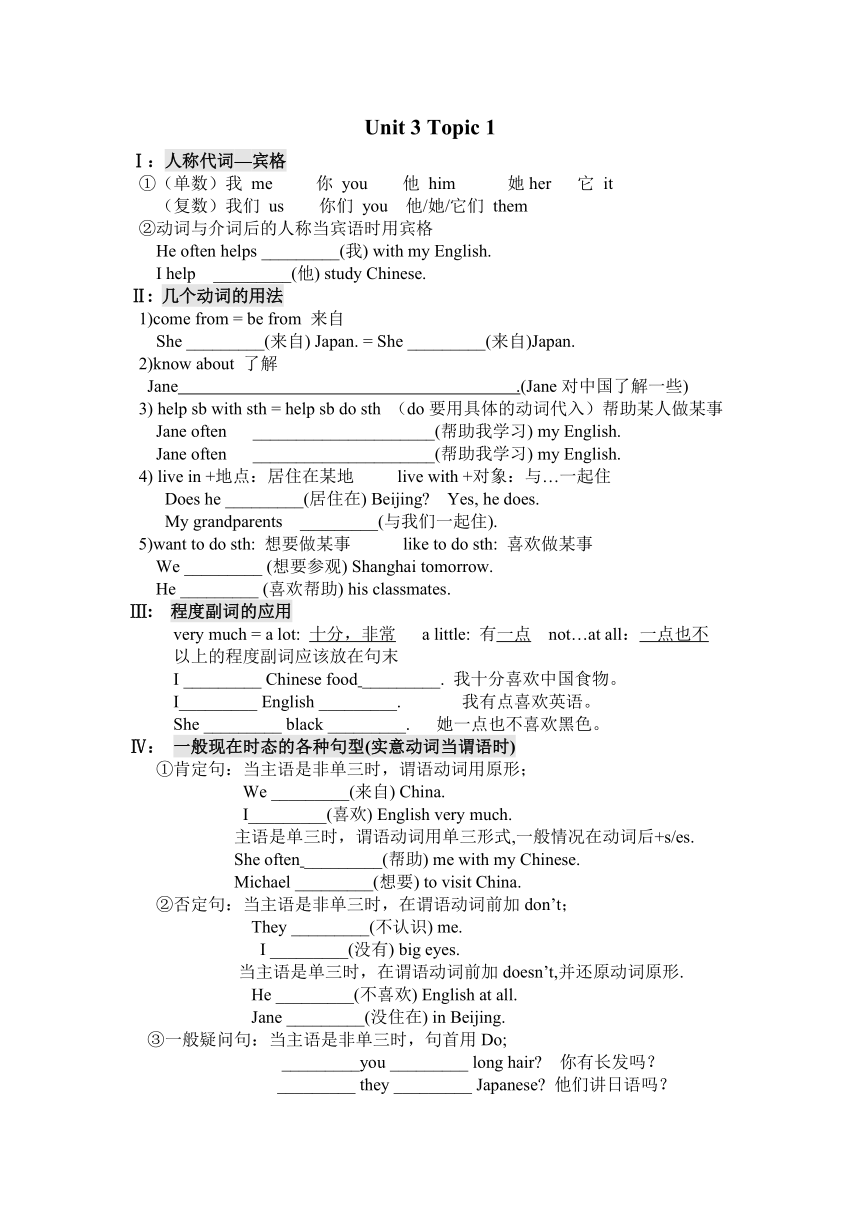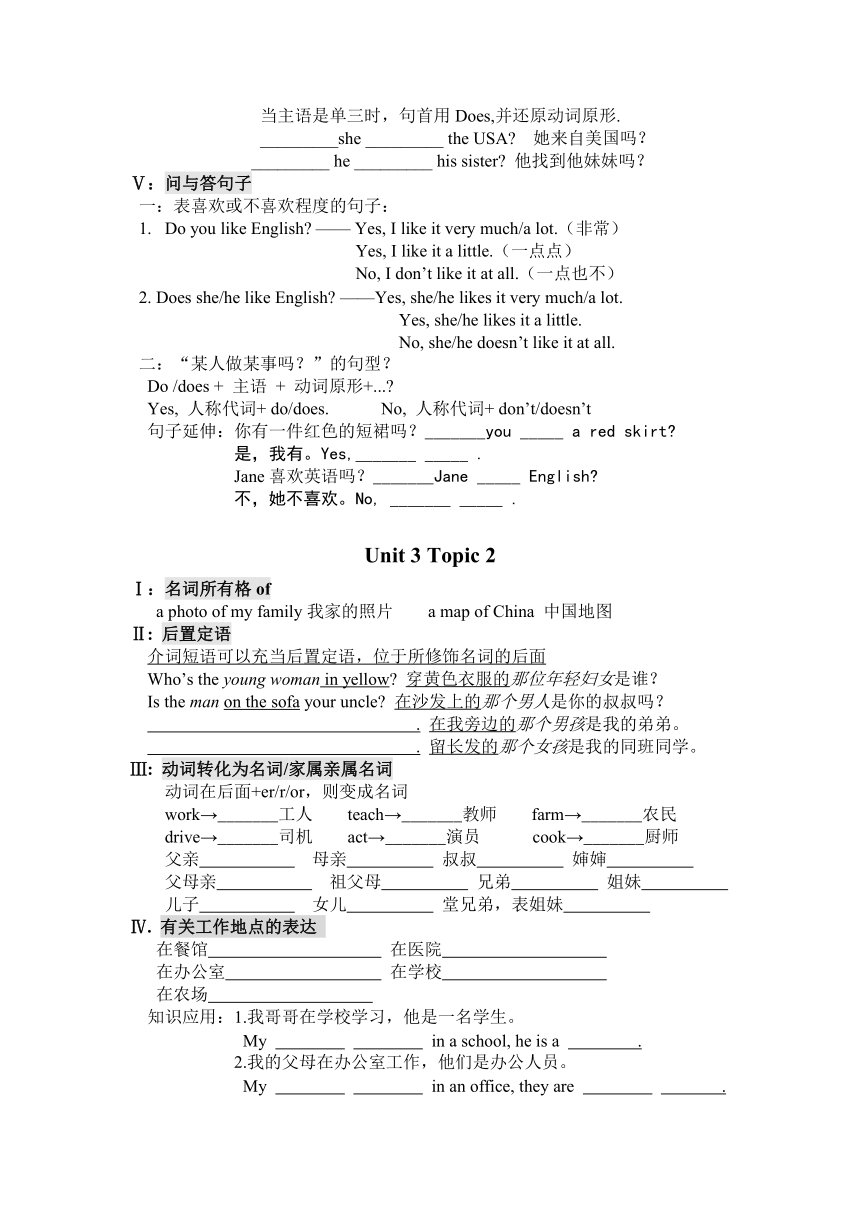Unit 3 Getting together复习学案
文档属性
| 名称 | Unit 3 Getting together复习学案 |

|
|
| 格式 | zip | ||
| 文件大小 | 19.3KB | ||
| 资源类型 | 教案 | ||
| 版本资源 | 仁爱科普版 | ||
| 科目 | 英语 | ||
| 更新时间 | 2015-01-18 00:00:00 | ||
图片预览


文档简介
Unit 3 Topic 1
Ⅰ:人称代词—宾格
①(单数)我 me 你 you 他 him 她her 它 it
(复数)我们 us 你们 you 他/她/它们 them
②动词与介词后的人称当宾语时用宾格
He often helps _________(我) with my English.
I help _________(他) study Chinese.
Ⅱ: 几个动词的用法
1)come from = be from 来自
She _________(来自) Japan. = She _________(来自)Japan.
2)know about 了解
Jane .(Jane对中国了解一些)
3) help sb with sth = help sb do sth (do要用具体的动词代入)帮助某人做某事
Jane often _____________________(帮助我学习) my English.
Jane often _____________________(帮助我学习) my English.
4) live in +地点:居住在某地 live with +对象:与…一起住
Does he _________(居住在) Beijing Yes, he does.
My grandparents _________(与我们一起住).
5)want to do sth: 想要做某事 like to do sth: 喜欢做某事
We _________ (想要参观) Shanghai tomorrow.
He _________ (喜欢帮助) his classmates.
Ⅲ: 程度副词的应用
very much = a lot: 十分,非常 a little: 有一点 not…at all:一点也不
以上的程度副词应该放在句末
I _________ Chinese food _________. 我十分喜欢中国食物。
I_________ English _________. 我有点喜欢英语。
She _________ black _________. 她一点也不喜欢黑色。
Ⅳ: 一般现在时态的各种句型(实意动词当谓语时)
①肯定句:当主语是非单三时,谓语动词用原形;
We _________(来自) China.
I_________(喜欢) English very much.
主语是单三时,谓语动词用单三形式,一般情况在动词后+s/es.
She often _________(帮助) me with my Chinese.
Michael _________(想要) to visit China.
②否定句:当主语是非单三时,在谓语动词前加don’t;
They _________(不认识) me.
I _________(没有) big eyes.
当主语是单三时,在谓语动词前加doesn’t,并还原动词原形.
He _________(不喜欢) English at all.
Jane _________(没住在) in Beijing.
③一般疑问句:当主语是非单三时,句首用Do;
_________you _________ long hair 你有长发吗?
_________ they _________ Japanese 他们讲日语吗?
当主语是单三时,句首用Does,并还原动词原形.
_________she _________ the USA 她来自美国吗?
_________ he _________ his sister 他找到他妹妹吗?
Ⅴ:问与答句子
一:表喜欢或不喜欢程度的句子:
Do you like English —— Yes, I like it very much/a lot.(非常)
Yes, I like it a little.(一点点)
No, I don’t like it at all.(一点也不)
2. Does she/he like English ——Yes, she/he likes it very much/a lot.
Yes, she/he likes it a little.
No, she/he doesn’t like it at all.
二:“某人做某事吗?”的句型?
Do /does + 主语 + 动词原形+...
Yes, 人称代词+ do/does. No, 人称代词+ don’t/doesn’t
句子延伸:你有一件红色的短裙吗?_______you _____ a red skirt
是,我有。Yes,_______ _____ .
Jane喜欢英语吗?_______Jane _____ English
不,她不喜欢。No, _______ _____ .
Unit 3 Topic 2
Ⅰ:名词所有格of
a photo of my family我家的照片 a map of China 中国地图
Ⅱ: 后置定语
介词短语可以充当后置定语,位于所修饰名词的后面
Who’s the young woman in yellow 穿黄色衣服的那位年轻妇女是谁?
Is the man on the sofa your uncle 在沙发上的那个男人是你的叔叔吗?
. 在我旁边的那个男孩是我的弟弟。
. 留长发的那个女孩是我的同班同学。
Ⅲ: 动词转化为名词/家属亲属名词
动词在后面+er/r/or,则变成名词
work→_______工人 teach→_______教师 farm→_______农民
drive→_______司机 act→_______演员 cook→_______厨师
父亲 母亲 叔叔 婶婶
父母亲 祖父母 兄弟 姐妹
儿子 女儿 堂兄弟,表姐妹
Ⅳ. 有关工作地点的表达
在餐馆 在医院
在办公室 在学校
在农场
知识应用:1.我哥哥在学校学习,他是一名学生。
My in a school, he is a .
2.我的父母在办公室工作,他们是办公人员。
My in an office, they are .
3.我的叔叔和婶婶是农民,他们在农场工作。
My and are ,they work .
4.我的父亲在餐馆煮饭,他是一名厨师。
My in a restaurant, he is a .
5.Tom的姐姐在医院工作,她是一名护士。
works , she is a
Ⅴ:问与答句子
What do/does+主语+do 主语+be+工作(询问工作的句型)
What do you do —— I am a student.
What do your parents do —— They are office workers.
What does the man do —— He is a cook.
Where do/does+主语+work 主语+work(s)+地点 (询问工作地点的句型)
Where does he work —— He works in a hospital.
Where do they work —— They work on a farm.
句子延伸:你姐姐是干什么的 _______ _____ your sister _____
她是一位英语老师。She is_______ _____ _____ .
Tom是做什么的?_______ _____ Tom _____
他是一位白领。He is _______ _____ _____ .
她在哪里工作?_______ _____ she _____
她在学校教语文。She _______ Chinese_____ _____ _____ .
你叔叔在哪里工作?_______ _____ your uncle _____
他在北京开车。He _______ a car _____ _____ .
你哥哥在福州工作吗?_______your brother _____ in Fuzhou
是的,他是。Yes, _____ _____ .
Unit 3 Topic3
Ⅰ:可数与不可数名词(食物类)
可数:苹果_______ 香蕉_______ 桔子_______ 鸡蛋_______ 汉堡_______
蔬菜_______ 蛋糕_______
不可数:鱼_______ 鸡肉_______ 面包_______ 米饭_______ 水_______
牛奶_______果汁_______ 饮料_______
Ⅱ:掌握以下短语(背)
请随便吃(喝)hel ( http: / / www.21cnjy.com )p yourself(to) 吃早餐/午餐/晚餐have/breakfast/lunch/dinner
下馆子eat out 点菜take your order …something to eat/drink:一些吃/喝的东西
怎么样what/how about为什么不why not 好主意 good idea
对...友好be kind to
知识应用:Please_______ _____ to some fish,Jane. (Jane,请随便吃鱼)
Please_______ _____ to some fish,kids. (孩子们,请随便吃鱼)
Mary usually_______ _____ at 6:00. (Mary经常在六点吃早饭)
I would like_______ _____ _____ with my friends.
(我想要与我的朋友下馆子)
My parents_______ _____ _____ _____ . (我的父母对我好)
Ⅲ: 掌握would like各种句型
1.某人想要某物:主语 + would like + 物体。(肯定句)
例:I would like an apple.
2.某人想要吃/喝某东西:主语 + would like to eat/drink + 物体。(肯定句)
例:I would like to eat an apple.
3.你想要某物吗?:Would you like + 物体 (一般疑问句)
Yes, please. / No, thanks.
例:Would you like some fish Yes, please.
4.你想要吃/喝某东西吗?:Would you like + to eat/drink物体 (一般疑问句)
Yes, please. / No, thanks.
例:Would you like to drink some juice No, thanks.
5. 你想要吃/喝什么?What would + you+ like to eat/drink (特殊疑问句)
句子延伸:你想要一些汉堡吗?_______ you_____ _____ _____
好的。_______ , _____ .
你想要一些鸡肉吗?_______ you_____ _____ _____
不,谢谢。_______ , _____ .
你想要一些喝的东西吗?______ you_____ _____ _____ _____
不,谢谢。_______ , _____ .
你想要喝什么?_____ _____ you_____ _____ _____
我想要一杯果汁?I’d like_______ _____ _____ juice
Ⅳ:问与答句子(背)
询问三餐的句型:
A: What do you usually have for breakfast/lunch/dinner
B: I usually have...
表建议的句型
Why not = Why don’t you +动词原形 —— Good idea.
为什么不...呢
What/How about +名词/动词ing —— Good idea.
...怎么样?
Would you like to 动词原形 —— Yes, I’d like to.
你想要...吗?
句子延伸:为什么不下馆子呢?_______ _____ _______ _____
下馆子怎么样?_______ _____ _______ _____
你想要下馆子吗?_______you _____ _____ _______ _____
作文模板:My Family
My name is... I’m a student of Grade Seven. I have a happy family.
There are(有).. ( http: / / www.21cnjy.com ).people in my family. My father is a/an... He works in/on... He likes... a lot. My mother is a/an... She works in/on... Her favorite food is...I have a brother/sister. He/she is a student. He/she studies in NO.1 high school. He /she likes to play with a cat. I like...very much.
My parents are kind to us. I love my family.
Ⅰ:人称代词—宾格
①(单数)我 me 你 you 他 him 她her 它 it
(复数)我们 us 你们 you 他/她/它们 them
②动词与介词后的人称当宾语时用宾格
He often helps _________(我) with my English.
I help _________(他) study Chinese.
Ⅱ: 几个动词的用法
1)come from = be from 来自
She _________(来自) Japan. = She _________(来自)Japan.
2)know about 了解
Jane .(Jane对中国了解一些)
3) help sb with sth = help sb do sth (do要用具体的动词代入)帮助某人做某事
Jane often _____________________(帮助我学习) my English.
Jane often _____________________(帮助我学习) my English.
4) live in +地点:居住在某地 live with +对象:与…一起住
Does he _________(居住在) Beijing Yes, he does.
My grandparents _________(与我们一起住).
5)want to do sth: 想要做某事 like to do sth: 喜欢做某事
We _________ (想要参观) Shanghai tomorrow.
He _________ (喜欢帮助) his classmates.
Ⅲ: 程度副词的应用
very much = a lot: 十分,非常 a little: 有一点 not…at all:一点也不
以上的程度副词应该放在句末
I _________ Chinese food _________. 我十分喜欢中国食物。
I_________ English _________. 我有点喜欢英语。
She _________ black _________. 她一点也不喜欢黑色。
Ⅳ: 一般现在时态的各种句型(实意动词当谓语时)
①肯定句:当主语是非单三时,谓语动词用原形;
We _________(来自) China.
I_________(喜欢) English very much.
主语是单三时,谓语动词用单三形式,一般情况在动词后+s/es.
She often _________(帮助) me with my Chinese.
Michael _________(想要) to visit China.
②否定句:当主语是非单三时,在谓语动词前加don’t;
They _________(不认识) me.
I _________(没有) big eyes.
当主语是单三时,在谓语动词前加doesn’t,并还原动词原形.
He _________(不喜欢) English at all.
Jane _________(没住在) in Beijing.
③一般疑问句:当主语是非单三时,句首用Do;
_________you _________ long hair 你有长发吗?
_________ they _________ Japanese 他们讲日语吗?
当主语是单三时,句首用Does,并还原动词原形.
_________she _________ the USA 她来自美国吗?
_________ he _________ his sister 他找到他妹妹吗?
Ⅴ:问与答句子
一:表喜欢或不喜欢程度的句子:
Do you like English —— Yes, I like it very much/a lot.(非常)
Yes, I like it a little.(一点点)
No, I don’t like it at all.(一点也不)
2. Does she/he like English ——Yes, she/he likes it very much/a lot.
Yes, she/he likes it a little.
No, she/he doesn’t like it at all.
二:“某人做某事吗?”的句型?
Do /does + 主语 + 动词原形+...
Yes, 人称代词+ do/does. No, 人称代词+ don’t/doesn’t
句子延伸:你有一件红色的短裙吗?_______you _____ a red skirt
是,我有。Yes,_______ _____ .
Jane喜欢英语吗?_______Jane _____ English
不,她不喜欢。No, _______ _____ .
Unit 3 Topic 2
Ⅰ:名词所有格of
a photo of my family我家的照片 a map of China 中国地图
Ⅱ: 后置定语
介词短语可以充当后置定语,位于所修饰名词的后面
Who’s the young woman in yellow 穿黄色衣服的那位年轻妇女是谁?
Is the man on the sofa your uncle 在沙发上的那个男人是你的叔叔吗?
. 在我旁边的那个男孩是我的弟弟。
. 留长发的那个女孩是我的同班同学。
Ⅲ: 动词转化为名词/家属亲属名词
动词在后面+er/r/or,则变成名词
work→_______工人 teach→_______教师 farm→_______农民
drive→_______司机 act→_______演员 cook→_______厨师
父亲 母亲 叔叔 婶婶
父母亲 祖父母 兄弟 姐妹
儿子 女儿 堂兄弟,表姐妹
Ⅳ. 有关工作地点的表达
在餐馆 在医院
在办公室 在学校
在农场
知识应用:1.我哥哥在学校学习,他是一名学生。
My in a school, he is a .
2.我的父母在办公室工作,他们是办公人员。
My in an office, they are .
3.我的叔叔和婶婶是农民,他们在农场工作。
My and are ,they work .
4.我的父亲在餐馆煮饭,他是一名厨师。
My in a restaurant, he is a .
5.Tom的姐姐在医院工作,她是一名护士。
works , she is a
Ⅴ:问与答句子
What do/does+主语+do 主语+be+工作(询问工作的句型)
What do you do —— I am a student.
What do your parents do —— They are office workers.
What does the man do —— He is a cook.
Where do/does+主语+work 主语+work(s)+地点 (询问工作地点的句型)
Where does he work —— He works in a hospital.
Where do they work —— They work on a farm.
句子延伸:你姐姐是干什么的 _______ _____ your sister _____
她是一位英语老师。She is_______ _____ _____ .
Tom是做什么的?_______ _____ Tom _____
他是一位白领。He is _______ _____ _____ .
她在哪里工作?_______ _____ she _____
她在学校教语文。She _______ Chinese_____ _____ _____ .
你叔叔在哪里工作?_______ _____ your uncle _____
他在北京开车。He _______ a car _____ _____ .
你哥哥在福州工作吗?_______your brother _____ in Fuzhou
是的,他是。Yes, _____ _____ .
Unit 3 Topic3
Ⅰ:可数与不可数名词(食物类)
可数:苹果_______ 香蕉_______ 桔子_______ 鸡蛋_______ 汉堡_______
蔬菜_______ 蛋糕_______
不可数:鱼_______ 鸡肉_______ 面包_______ 米饭_______ 水_______
牛奶_______果汁_______ 饮料_______
Ⅱ:掌握以下短语(背)
请随便吃(喝)hel ( http: / / www.21cnjy.com )p yourself(to) 吃早餐/午餐/晚餐have/breakfast/lunch/dinner
下馆子eat out 点菜take your order …something to eat/drink:一些吃/喝的东西
怎么样what/how about为什么不why not 好主意 good idea
对...友好be kind to
知识应用:Please_______ _____ to some fish,Jane. (Jane,请随便吃鱼)
Please_______ _____ to some fish,kids. (孩子们,请随便吃鱼)
Mary usually_______ _____ at 6:00. (Mary经常在六点吃早饭)
I would like_______ _____ _____ with my friends.
(我想要与我的朋友下馆子)
My parents_______ _____ _____ _____ . (我的父母对我好)
Ⅲ: 掌握would like各种句型
1.某人想要某物:主语 + would like + 物体。(肯定句)
例:I would like an apple.
2.某人想要吃/喝某东西:主语 + would like to eat/drink + 物体。(肯定句)
例:I would like to eat an apple.
3.你想要某物吗?:Would you like + 物体 (一般疑问句)
Yes, please. / No, thanks.
例:Would you like some fish Yes, please.
4.你想要吃/喝某东西吗?:Would you like + to eat/drink物体 (一般疑问句)
Yes, please. / No, thanks.
例:Would you like to drink some juice No, thanks.
5. 你想要吃/喝什么?What would + you+ like to eat/drink (特殊疑问句)
句子延伸:你想要一些汉堡吗?_______ you_____ _____ _____
好的。_______ , _____ .
你想要一些鸡肉吗?_______ you_____ _____ _____
不,谢谢。_______ , _____ .
你想要一些喝的东西吗?______ you_____ _____ _____ _____
不,谢谢。_______ , _____ .
你想要喝什么?_____ _____ you_____ _____ _____
我想要一杯果汁?I’d like_______ _____ _____ juice
Ⅳ:问与答句子(背)
询问三餐的句型:
A: What do you usually have for breakfast/lunch/dinner
B: I usually have...
表建议的句型
Why not = Why don’t you +动词原形 —— Good idea.
为什么不...呢
What/How about +名词/动词ing —— Good idea.
...怎么样?
Would you like to 动词原形 —— Yes, I’d like to.
你想要...吗?
句子延伸:为什么不下馆子呢?_______ _____ _______ _____
下馆子怎么样?_______ _____ _______ _____
你想要下馆子吗?_______you _____ _____ _______ _____
作文模板:My Family
My name is... I’m a student of Grade Seven. I have a happy family.
There are(有).. ( http: / / www.21cnjy.com ).people in my family. My father is a/an... He works in/on... He likes... a lot. My mother is a/an... She works in/on... Her favorite food is...I have a brother/sister. He/she is a student. He/she studies in NO.1 high school. He /she likes to play with a cat. I like...very much.
My parents are kind to us. I love my family.
同课章节目录
- Unit 1 Making new friends
- Topic 1 Welcome to China!
- Topic 2 Where are you from?
- Topic 3 How old are you?
- Unit 2 Looking different
- Topic 1 I have a small nose
- Topic 2 What does she look like?
- Topic 3 Whose jacket is this?
- Unit 3 Getting togethe
- Topic 1 Does he speak Chinese?
- Topic 2 What do your parents do?
- Topic 3 What would you like to drink?
- Unit 4 Having fun
- Topic 1 What can I do for you?
- Topic 2 Would you like to cook with us?
- Topic 3 What time is it now?
